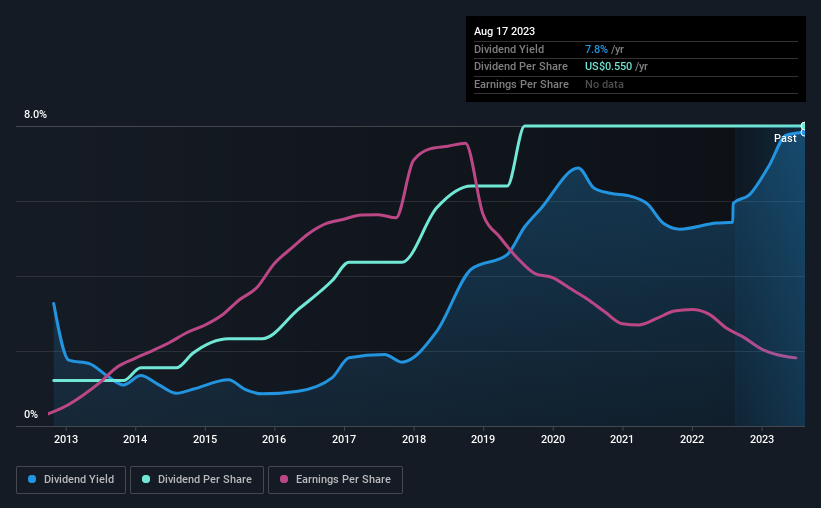Don't Buy Hennessy Advisors, Inc. (NASDAQ:HNNA) For Its Next Dividend Without Doing These Checks
Hennessy Advisors, Inc. (NASDAQ:HNNA) stock is about to trade ex-dividend in 4 days. Typically, the ex-dividend date is one business day before the record date which is the date on which a company determines the shareholders eligible to receive a dividend. The ex-dividend date is important because any transaction on a stock needs to have been settled before the record date in order to be eligible for a dividend. Therefore, if you purchase Hennessy Advisors' shares on or after the 22nd of August, you won't be eligible to receive the dividend, when it is paid on the 6th of September.
The company's next dividend payment will be US$0.14 per share. Last year, in total, the company distributed US$0.55 to shareholders. Based on the last year's worth of payments, Hennessy Advisors stock has a trailing yield of around 7.8% on the current share price of $7.02. If you buy this business for its dividend, you should have an idea of whether Hennessy Advisors's dividend is reliable and sustainable. So we need to investigate whether Hennessy Advisors can afford its dividend, and if the dividend could grow.
See our latest analysis for Hennessy Advisors
Dividends are typically paid out of company income, so if a company pays out more than it earned, its dividend is usually at a higher risk of being cut. Its dividend payout ratio is 87% of profit, which means the company is paying out a majority of its earnings. The relatively limited profit reinvestment could slow the rate of future earnings growth. We'd be worried about the risk of a drop in earnings.
Companies that pay out less in dividends than they earn in profits generally have more sustainable dividends. The lower the payout ratio, the more wiggle room the business has before it could be forced to cut the dividend.
Click here to see how much of its profit Hennessy Advisors paid out over the last 12 months.
Have Earnings And Dividends Been Growing?
When earnings decline, dividend companies become much harder to analyse and own safely. If business enters a downturn and the dividend is cut, the company could see its value fall precipitously. With that in mind, we're discomforted by Hennessy Advisors's 20% per annum decline in earnings in the past five years. Such a sharp decline casts doubt on the future sustainability of the dividend.
The main way most investors will assess a company's dividend prospects is by checking the historical rate of dividend growth. In the last 10 years, Hennessy Advisors has lifted its dividend by approximately 21% a year on average. The only way to pay higher dividends when earnings are shrinking is either to pay out a larger percentage of profits, spend cash from the balance sheet, or borrow the money. Hennessy Advisors is already paying out 87% of its profits, and with shrinking earnings we think it's unlikely that this dividend will grow quickly in the future.
To Sum It Up
Should investors buy Hennessy Advisors for the upcoming dividend? Earnings per share have been declining and the company is paying out more than half its profits to shareholders; not an enticing combination. These characteristics don't generally lead to outstanding dividend performance, and investors may not be happy with the results of owning this stock for its dividend.
Having said that, if you're looking at this stock without much concern for the dividend, you should still be familiar of the risks involved with Hennessy Advisors. For example, we've found 2 warning signs for Hennessy Advisors (1 makes us a bit uncomfortable!) that deserve your attention before investing in the shares.
A common investing mistake is buying the first interesting stock you see. Here you can find a full list of high-yield dividend stocks.
Have feedback on this article? Concerned about the content? Get in touch with us directly. Alternatively, email editorial-team (at) simplywallst.com.
This article by Simply Wall St is general in nature. We provide commentary based on historical data and analyst forecasts only using an unbiased methodology and our articles are not intended to be financial advice. It does not constitute a recommendation to buy or sell any stock, and does not take account of your objectives, or your financial situation. We aim to bring you long-term focused analysis driven by fundamental data. Note that our analysis may not factor in the latest price-sensitive company announcements or qualitative material. Simply Wall St has no position in any stocks mentioned.

